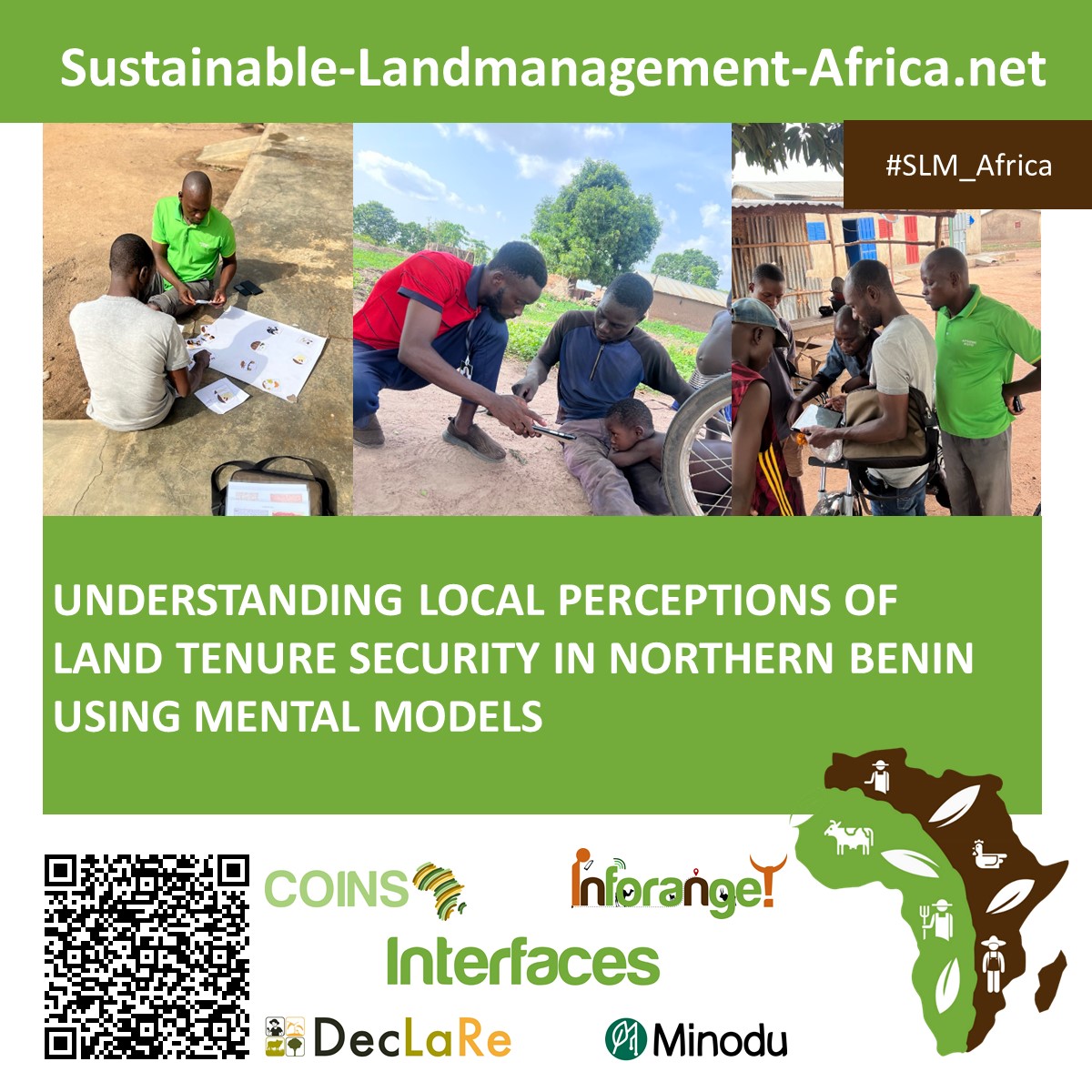In Northern Benin, like many parts of West Africa, land tenure security is crucial to sustainable land management and community well-being. Land tenure security refers to the assurance that individuals or groups have over land ownership and use rights. Secure land tenure is generally associated with increased investments and engagement in land improvements, as landowners feel confident that they will benefit from their efforts in the long term. In Benin, a customary land title known as “Attestation de Détention Coutumière” (ADC) serves as a form of legal recognized land tenure. This blog discusses a recent research effort in Northern Benin, where a unique mental model methodology to collect data has been employed to explore how different local communities’ groups perceive the benefits, limitations and border of holding an ADC. The preliminary findings of the study offer valuable insights that inform policies genuinely reflecting the actual needs and concerns of local communities.
Why use a mental model-based methodology?
Mental models are an interactive and participatory research approach that captures how people think about a particular issue by mapping their beliefs, values, and perceptions. A digital mapping and modelling tool called M-Tool is used to collect and analyse mental models’ data[1]. M-Tool is specifically adapted for rural contexts with low literacy levels and where comparisons between different socio-demographic groups are intended. This implies the simple use of visual icons, arrows, audio prompts and other signs by participants to create visual maps of their thoughts on the benefits, limitations, and implications of land tenure security for sustainable management. By examining these maps, researchers can understand the complex and often subtle ways in which local communities connect land tenure security to their livelihoods and to broader aspects of sustainable land management.
Fieldwork for data collection on mental models in Northern Benin
Fieldwork has been conducted with 300 households surveyed across 10 localities in Borgou and Donga departments of Northern Benin to collect mental model data and local insights to inform sustainable land management. To capture diverse perspectives, participants were from different socio-demographic groups of farmers including men, women, migrants, and non-migrants. Using M-Tool setup on different tablets with 13 visual icons as drivers, audios, arrows, and the signs “+” and “–” respectively to indicate positive and negative impacts, participants were asked to link their perceptions on the benefits, limitations, and implications of ADC to sustainable land management.
The data collection began with a pre-test in the field where the M-Tool was tested on the tablets with a sample of farmers to assess the ease of comprehension of the visual icons and their user-friendliness. During the main data collection and in each locality, the field agents started the community engagement by meeting the communities’ chiefs for introduction and presentation of the study’s objectives. At farmers’ level, consent was first secured from each respondent, followed by explanation, initiation and simulation with M-Tool, and then the data collection. These first steps to engage the local communities are essential to foster trust and legitimacy with them.
However, conducting this data collection was not without challenges. Indeed, like any fieldwork in general, the field agents went through logistical hurdles as well as some reluctance. In most of the localities, access to migrant farmers (as we were also interested in migrant farmers’ perceptions) was difficult, because they generally live far from the localities centre, although they are part of the communities. Community entry was challenging when localities and hamlets subdivisions were unknown. This difficulty has been managed by integrating into our planning and strategy, allowing to overcome it, e.g. by readjusting the fieldwork duration. The language barrier was challenging, requiring hiring and training local translators, to ensure accurate translation and good understanding of the visual icons and key terminologies, contribution to an efficient utilisation of M-Tool. Another challenge was the reluctance of some farmers both women and men because of the complete digital features and functioning of M-Tool. Some were also worried that signing consent forms might mean selling their land. In some cases, misconceptions arose with a few of respondents humorously mistaking the field agents for medicines sellers. However, by clearly explaining the objectives of the study and data collection emphasizing the benefits of the outcomes for them, field agents have been able to overcome these challenges and efficiently collect the data. Finally, men were typically away in the mornings for fieldwork, so field agents prioritized interviewing women during this time, and men in the afternoons when they return.
Despite all these challenges, most of the farmers were wholeheartedly fully engaged; contributing valuable insights that helped deepen and enrich the understanding of local perspectives on the implications of land tenure security, particularly the ADC for sustainable land management.




